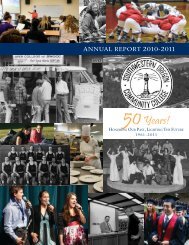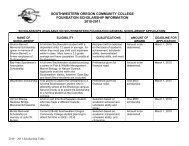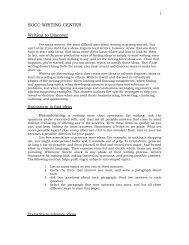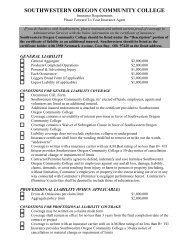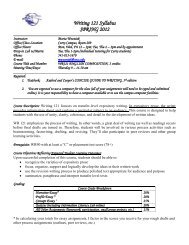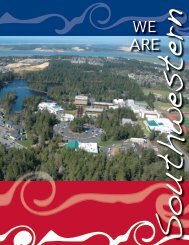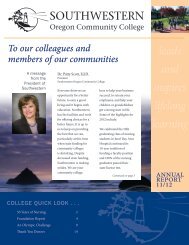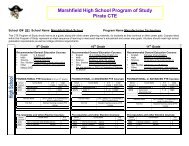Part 1 3.7.qxp - Southwestern Oregon Community College
Part 1 3.7.qxp - Southwestern Oregon Community College
Part 1 3.7.qxp - Southwestern Oregon Community College
You also want an ePaper? Increase the reach of your titles
YUMPU automatically turns print PDFs into web optimized ePapers that Google loves.
Course Descriptions<br />
ENGLISH - SEE LITERATURE AND<br />
WRITING<br />
ENVIRONMENTAL TECHNOLOGY<br />
ENV102 Introduction to Water Resources<br />
3 credits (3 lec, 1.5 lab hrs/wk)<br />
This course examines the role of water in the natural<br />
world and in modern society. Students will be introduced<br />
to general principles of hydrology and stream and<br />
channel morphology. Management of water resources,<br />
including supply, distribution, uses, conservation,<br />
protection, waste water treatment, and pollution, will be<br />
examined, with emphasis on <strong>Oregon</strong> and local water<br />
resources, problems, and governance. Offered every<br />
other year.<br />
ENV145 Environmental Sampling<br />
3 credits (2 lec, 3 lab hrs/wk)<br />
A lecture and laboratory course designed to provide<br />
students with the knowledge and field experience in<br />
environmental sampling. This course will cover<br />
fundamentals of sampling for various environmental<br />
parameters including water, soils, riparian or other habitat<br />
and biota. Emphasis will be placed on the accurate<br />
collection of data with the use of common field and<br />
laboratory techniques used in environmental monitoring.<br />
Students will learn the importance of data management<br />
analysis and reporting.<br />
ENV148 Conservation of Environmental<br />
Resources<br />
3 credits (3 lec hrs/wk)<br />
This course examines the need, importance, and<br />
philosophy of conservation in a contemporary world.<br />
Human dependency on an understanding of ecological<br />
principles and natural systems are emphasized. Topics to<br />
be discussed include natural resource classification;<br />
history, importance, and current methods of conservation;<br />
resource management issues; citizens’ role in<br />
conservation; and prospects for the future. Current<br />
environmental issues are discussed from a local,<br />
national, and global perspective. This course is designed<br />
to increase student awareness of the importance of<br />
conservation as a social and behavioral science, and to<br />
increase student participation in natural resource<br />
conservation. This course is offered every other year.<br />
ENV235 Introduction to Soil Science<br />
4 credits (3 lec, 1 lab hrs/wk)<br />
An introduction to the physical, chemical, and<br />
biological properties of soil as influenced by climate and<br />
geologic processes. Emphasis is placed on the<br />
understanding of soil processes and includes issues of<br />
disturbance, erosion, productivity, and conservation. The<br />
behavior of water in soil and soil-water interactions will<br />
also be discussed.<br />
FIRE SCIENCE TECHNOLOGY<br />
FS996Q Fire Science Driver<br />
2 credits (18 lec, 12 lec-lab hr/total)<br />
This course is designed to provide firefighter students<br />
with concepts in emergency driving, defensive driving,<br />
<strong>Oregon</strong> law/policies, and vehicle maintenance. Students<br />
will also receive skills and knowledge to drive and<br />
maintain emergency vehicles.<br />
FS5230/5231/5232 Company Drills, <strong>Part</strong> A, B, C<br />
1.5 credits (1 lec, 1 lec-lab hr/wk)<br />
Course is designed to provide second-year fire<br />
science students with the opportunity to gain an<br />
awareness of the various types of emergencies which<br />
they may encounter as professional firefighters. Each<br />
scenario is somewhat limited in scope, yet should<br />
stimulate the student to further develop needed skills and<br />
self-study to help them prepare for potential incidents.<br />
Prerequisites: FS5244, FS5245 and FS5246 with a “C”<br />
or better and instructor consent.<br />
FS5244 National Fire Protection Association<br />
(NFPA) Firefighter I, <strong>Part</strong> A: Entry Level<br />
Firefighter Training Program<br />
3.5 credits (3 lec, 1.5 lab hrs/wk)<br />
This course is designed to provide the beginning<br />
fire science student with the basic knowledge and<br />
hands-on skills necessary to be involved in fire<br />
suppression activities under the direct supervision of a<br />
skilled firefighter. <strong>Oregon</strong>’s Department of Public Safety<br />
Standards and Training (DPSST) establishes this level as<br />
meeting the requirements for paid and volunteer<br />
firefighters to be actively involved in fire suppression<br />
activities. This course meets the performance-based<br />
objectives established in the National Fire Protection<br />
Association (NFPA) Standard 1001, Standard for<br />
Firefighter Professional Qualifications, and NFPA<br />
Standard 1403, Entry Level Firefighter Training Program.<br />
FS5245 National Fire Protection Association<br />
(NFPA) Firefighter I, <strong>Part</strong> B<br />
3 credits (2.5 lec, 1 lec-lab hrs/wk)<br />
This course, along with NFPA Firefighter I, <strong>Part</strong> A is<br />
designed to provide the beginning fire science student<br />
with the basic knowledge and hands-on skills necessary<br />
to be involved in fire suppression activities under the<br />
direct supervision of a skilled firefighter.<br />
<strong>Southwestern</strong> <strong>Oregon</strong> <strong>Community</strong> <strong>College</strong> 2006-07 Catalog www.socc.edu Course Descriptions 169



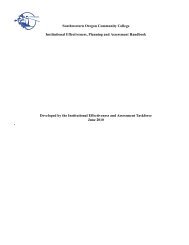
![SWOCC Viewbook [PDF] - Southwestern Oregon Community College](https://img.yumpu.com/26373688/1/190x245/swocc-viewbook-pdf-southwestern-oregon-community-college.jpg?quality=85)
